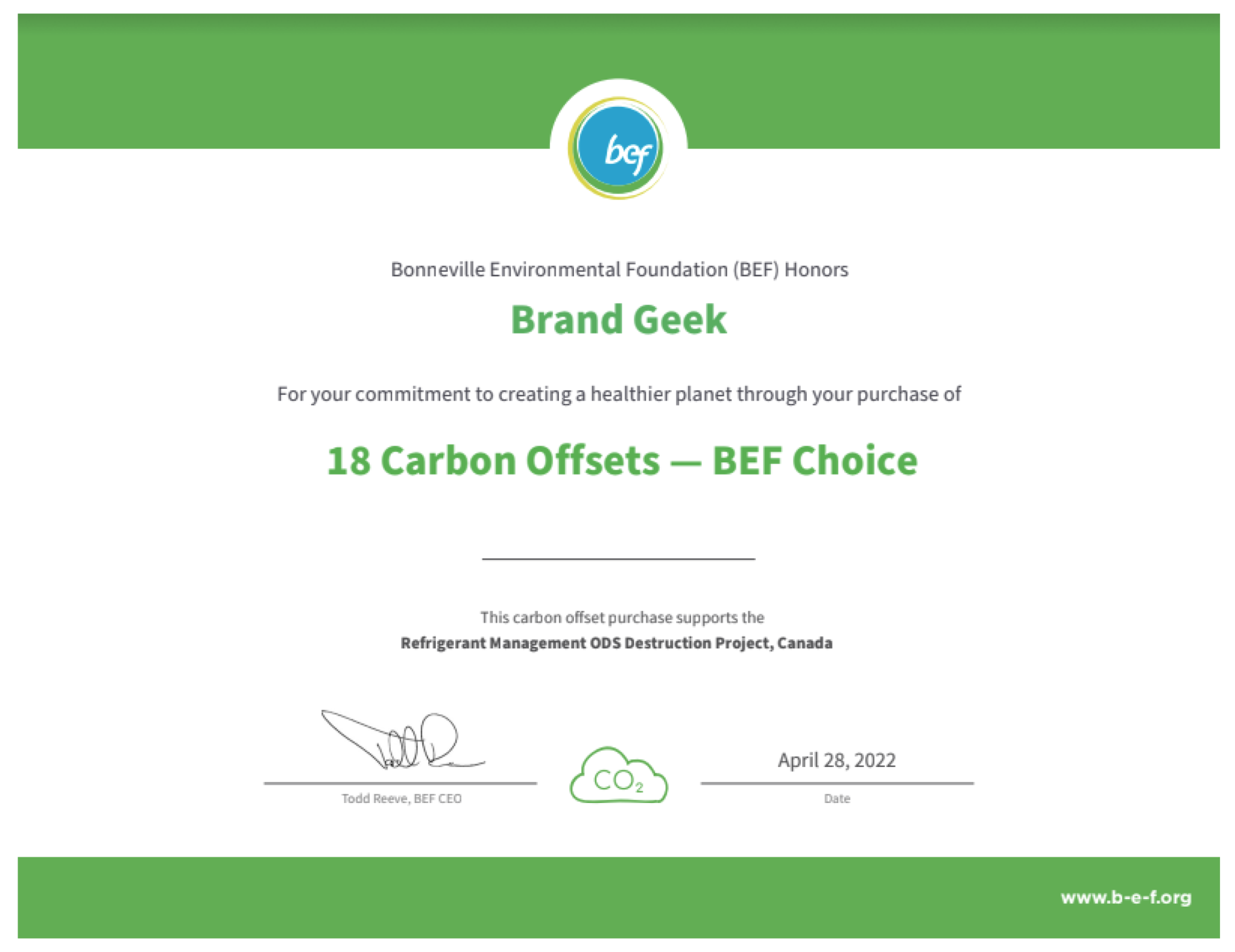Brandgeek proudly supports Mountain Area Preservation and is humbled to be…
Fiji Fights Back Greenwashing Claim — Dismissal of Fiji Green Seal Case Affirmed
Last Thursday, May 26, 2011, the California Court of Appeals affirmed the dismissal of potential class action lawsuit filed in California State Court by Ayana Hill against Roll Int’l Corp (Roll) and Fiji Water (Fiji) (together Fiji). Hill’s complaint alleged common law fraud and unjust enrichment, as well as violation of California’s Unfair Competition Law (UCL) (Bus. & Prof. Code, § 17200 et seq.) False Advertising Law (§ 17500 et seq.), and Consumers Legal Remedies Act (CLRA) (Civ. Code, § 1750 et seq.). The trial court dismissed Hill’s case, ruling that Hill failed to state a cause of action [on which relief can be granted]. The appeals court affirmed.
Hill’s claims stemmed from Fiji’s use of the green water drop logo shown above. Hill claimed that she paid a 15% premium to purchase Fiji water based on this logo, which indicated to her that Fiji water was environmentally superior to other waters and endorsed by a third party organization. Presuming that others had the same experience, Hill proposed that a class be certified on behalf of herself and other Fiji water consumers, all of whom she asserted were duped into purchasing Fiji water over other brands by its guileful green drop logo.
According to the Order, Hill’s complaint alleged that increasing environmental consciousness has spawned a movement that demands products that are “environmentally superior” in their manufacturing, packaging and distribution [and disposal] processes. Such products commonly are referred to as “green,” as are those who purchase them. (This is what makes GREEN marks descriptive and weak.) Hill asserted that greenwashing has become so rampant, the FTC issued standards known as the Green Guides to protect consumers against it. (I posted about the Guides here and published an article about them here. Revised Guides are expected to be published by the end of this year; proposed revisions summary here.) Hill claimed that Fiji violated several of the provisions of the Green Guides, including use of general environmental benefit claims.
According to the appeals court order:
[framed_box]Broadly stated: The UCL prohibits “any unlawful, unfair or fraudulent business act or practice and unfair, deceptive, untrue or misleading advertising and any act prohibited by the [FAL]” (§ 17200); the FAL prohibits advertising “which is untrue or misleading, and which is known, or which by the exercise of reasonable care should be known, to be untrue or misleading” (§ 17500); and the CLRA prohibits specified “unfair methods of competition and unfair or deceptive acts or practices” (Civ. Code, § 1770, subd. (a)). While the operative language of each law differs, Hill bases each claimed violation on an act not itself made a cause action. She uses the Environmental Marketing Claims Act (EMCA) (§ 17580 et seq.), section 17580.5, subdivision (a) of which incorporates into the EMCA definition of “’environmental marketing claim’ . . . any claim contained in the ‘Guides for the Use of Environmental Marketing Claims’ published by the Federal Trade Commission” (16 C.F.R., pt. 260 (2011)) (hereafter guides, or FTC guides).[/framed_box]
In other words (those most of you will recognize as English, unlike the legalese above) . . . (1) Hill claimed that Fiji’s actions violated the Green Guides, and (2) The Green Guides are not enforceable [by private citizens, only by the FTC]. The appeals court further found that it was unreasonable for Hill to be misled into thinking that the green drop logo on Fiji water was a third party seal implicitly indicating environmentally superiority to competitors’ bottled water.
The Order specifically states:
[framed_box] Does the green drop on Fiji water bottles convey to a reasonable consumer in the circumstances that the product is endorsed for environmental superiority by a third party organization? No. The court continued, “Fiji water has just a green drop, the drop being the most logical icon for its particular product — water.” We assume, for demurrer purposes, that reasonable consumers would view the drop, together with its green color, as referring to the environment, but the FTC guides do not prohibit, in the complaint’s words, “touting” a product’s “green” features. By providing guidelines and a “safe harbor” for advertisers wanting to make environmental marketing claims (id., § 260.3 (2011)), the guides promote making them, provided only that they do not mislead reasonable consumers.[/framed_box]
The court also found that the fijigreen.com website in close proximity to the green water drop should have made clear to a reasonable consumer that the logo was a symbol of Fiji water not a third party organization. The appeals court distinguished Hill’s case from the Greenlist case, even though that case has no precedential value, stating that the Greenlist label was very different from Fiji’s label in that it, “made express representations of environmental superiority, used the trademarked name ‘Greenlist,’ a name not immediately apt to be associated with the product or its manufacturers, and identified the name as a rating system,” all of which suggested it was from an independent source. Because neither Fiji’s green drop logo, its Fijigreen.com website, or the “Every Drop Is Green” slogan would mislead a reasonable person, the appeals court agreed with the trial court that Hill’s common law fraud claim also failed.
 Litigators who are hoping that “green claims” will be the next class action cash cow might want to reconsider that, at least in California. California brand owners still are not off the hook since the FTC can enforce its Guides and competitors can bring cases in federal court and before NAD as well.
Litigators who are hoping that “green claims” will be the next class action cash cow might want to reconsider that, at least in California. California brand owners still are not off the hook since the FTC can enforce its Guides and competitors can bring cases in federal court and before NAD as well.






[…] So that got me wondering whether use of SOLAR for non-solar energy powered goods/services (like oil & gas drilling!) comports with the FTC Green Guides? Well, the Green Guides don’t define “solar” (you think that’s cause the term is defined in the dictionary?). The question under the FTC Green Guides (current and proposed) is whether the term improperly conveys an environmental benefit to the consumer. My presumption is that no consumer will confuse the brand SOLAR for an environmental marketing claim on gas turbines, electric battery chargers or oil and gas drilling services. Thus, no FTC Green Guide or false advertising claim, as was the holding in the recent Fiji water case. […]
[…] 17580.5 makes it unlawful to violate the FTC Green Guides, about which I wrote here, here, here, here, here, here, and here (yeah, I’m kinda passionate about responsible business and responsible […]